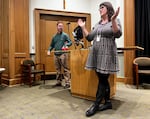Editor’s note: For Election 2024, OPB has been diligently following local races, providing comprehensive coverage of campaigns and measures. Check results on the presidential race, key congressional battles and other outcomes at OPB’s elections page.
“How do we keep relationships with people who voted differently than me?”
“Is there a way we can unify again?”
“What do we do now?”
These are some of the big questions University of Portland students were asking at a post-election “decompression session” offered by the private Catholic college this week.
Some young people who voted for Vice President Kamala Harris, especially those who voted for the first time this year, say they are baffled by the results from this week’s presidential election. Harris won in Oregon, but lost to former President Donald Trump nationally.
Some students feel sad, confused and anxious. Others feel angry and disrespected. But no matter where young voters fall on the political spectrum, it’s safe to say that many are feeling extreme emotions this week.
“I’ve been feeling really heavy, almost like there’s been a cloud over my head,” said 21-year-old UP senior Sophia Barton. She cast a ballot in favor of Harris.
“I’ve been trying really hard to think rationally and put my emotions to the side. I think this is a really good example of how hard that can be when you feel so emotionally tied to a cause.”
Initial polling data shows a slim majority of young people voted for Harris on Tuesday. Now, after a loss that feels deeply personal to some, college students across the nation — from Howard University to North Portland — are looking for ways to move forward and bridge divides.
Dealing with the intense emotions related to the election has been difficult for Barton. But through a new course offered this year at UP, she’s learned some new strategies to manage relationships with people who have different viewpoints than her.

Pictured on Nov. 6, 2024, University of Portland is one of a number of colleges across the nation that offered extra support and resources to students after this week's presidential election.
Tiffany Camhi / OPB
The class, called “Democracy and Diversity,” is one of several course options that can satisfy UP’s core curriculum requirement for undergraduate students. The course focuses on constructive dialogue, a type of communication that strives to build understanding among groups of people.
“It’s a way of interacting in the world,” said UP professor Anne Santiago, who teaches the class at the university and facilitated the Wednesday evening decompression event. “Constructive dialogue is the idea that you are in relationship with other people in a way that you’re trying to understand where they’re coming from.”
The idea of constructive dialogue is rooted in listening and curiosity, rather than being right or wrong. Students are taught to critically question their own beliefs, recognize echo chambers and look for commonalities among communities instead of differences.
“There is a place for debate. There is a place for discussion. There is a place for protest,” Santiago said. “But in some situations, we want to be able to understand each other.”

University of Portland professor Anne Santiago leads a discussion on how to bridge divides after the election on Nov. 6, 2024.
Tiffany Camhi / OPB
For many young people, that situation is happening now.
Barton is using what she’s learned in class outside in the real world this week. She said one of her biggest takeaways so far is the concept of eliminating fear.
“That is what leads to a lot of division today, the fear of the other side,” said Barton. “So I’ve been working on asking reflective questions and instead of making assumptions — trying to get to the root and asking ‘Why do they feel this way?’ and ‘Why do I feel the opposite way?’”
UP senior Tait Vigeland, another student in the class, is also disappointed by the results of the presidential race. She’s trying to reconcile that nearly half of U.S. voters didn’t vote the same way as her.
Vigeland, who comes from a conservative family, said she woke up to jubilant text messages from them on Wednesday.
“I don’t really relate to that, but I also know that that’s not just a Republican, that’s my dad. That’s the man who coached my soccer team, made me breakfast in the morning and drove me to school,” said Vigeland. “So I’m trying to appreciate more of what people offer, what people have to say and how they’re there for you in other ways.”
Another simple way to put it, see people as people, said Vigeland.
“One person’s perspective or point of view on one issue does not encapsulate all of who they are,” said Vigeland.
This type of dialogue is not easy, especially when people are emotionally invested in their beliefs and identities. It takes a lot of humility to begin questioning your own values, said Santiago.
It will be a challenge, but not an impossible task, she said.
“When we see other people who are saying things that seem completely at odds with what we believe and who we are, it makes us feel really marginalized,” said Santiago. “Until we start being willing to understand all of the components that go into making us who we are, we’re not going to be able to live in community.”
